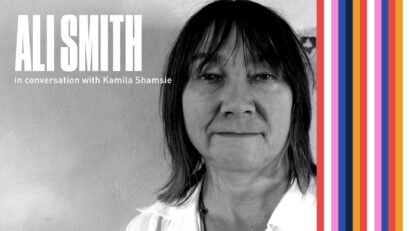 MLF Chapter & Verse
MLF Chapter & Verse
The Manchester Literature Festival Blog
Review: Ali Smith in conversation with Kamila Shamsie
Young Digital Reporter Grace Tomlinson discovers an interesting discussion across time at Ali Smith in conversation with Kamila Shamsie.
This latest instalment, directed by Sarah Wood, in a series of what novelist Kamila Shamsie dubs ‘lockdown films’, combines audio of the conversation between Smith and Shamsie with long, peaceful visuals created by all three women. Moving between Kamila’s California and Ali’s Cambridge, the audience is treated to views of softly swaying lavender, apricot trees, and windows lit by the sun. The conversation is punctuated with readings of Ali’s latest novel in her Seasonal Quartet, Summer.
Kamila begins with a discussion of the ‘origin story’ of the Seasonal Quartet. Ali explains that a set of novels about the seasons, ‘connected but disconnected’, had ‘been in the back of [her] head for a long time’. It wasn’t until her 2014 novel, How to be both, was published on time, despite handing in the manuscript almost a year late, that the possibility of a ‘time experiment’, a set of novels ‘about the time in which I am writing’, suddenly felt open to her. Kamila points to the ability of the entire Quartet to ‘place you in the moment you are in and also take you out [of it]’. Watching the recording, it feels very much like the same principle extends to the film itself. It could only be watched at the time it was shown unlike most other events at the Festival, which were available to rewatch for three days after the first streaming. A conversation across time zones, recorded three weeks earlier, allows space for both the awareness of a specific moment, and a sense of escapism.
The conversation moves towards the ways in which discipline, and what Kamila terms a ‘wonderful quality of improvisation’, work together throughout the Quartet, in order to allow for this idea of writing with attention to the ‘very contemporary’. Kamila directs Ali’s own praise of Ella Fitzgerald, of whom she has been a long-time admirer, towards the Quartet, prompting a description of Ali’s attention to the ‘holding of […] opposites’, within her own work, and within Fitzgerald’s. She explains that ‘we are not one thing… if you can suggest that […], you will have granted freedom within the form’. This is one of the ways in which she moves towards a ‘lightness’ that runs alongside a potentially ‘heavy’ subject matter.
Throughout the event, Ali points to story as ‘one of the best ways of getting to the truth’. The ‘gift of fiction’ is how it ‘allows us to be part of it and think where we are, communally and in society and in time’. The idea that Kamila picks out, built into the very structure of the Quartet, ‘of hope and change and renewal’, is reflected in the process, Ali explains. Writing the novels was like ‘being accompanied by a relief, a constant friend, who says, times pass’. And since the film itself was such a bright spot in otherwise ‘very, very grim times’, anyone who tuned into the showing was also reminded that ‘times pass’.
